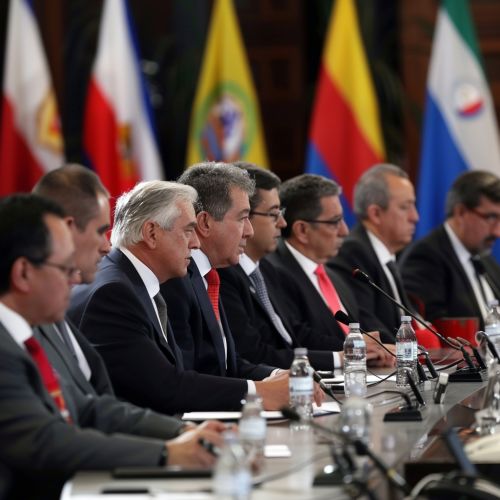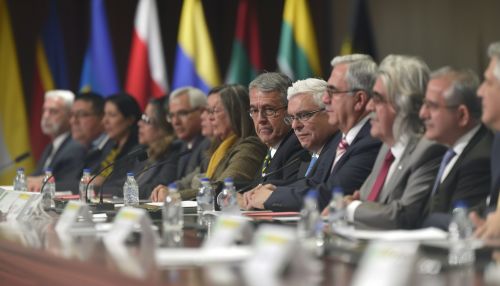Bolivarian Alliance for the Peoples of Our America: Difference between revisions
(Created page with "== Overview == The '''Bolivarian Alliance for the Peoples of Our America''' (ALBA) is an intergovernmental organization based on the idea of social, political, and economic integration among the countries of Latin America and the Caribbean. It was founded in 2004 by Venezuela and Cuba as an alternative to the Free Trade Area of the Americas (FTAA), which was proposed by the United States. ALBA emphasizes solidarity, mutual aid, and cooperation over the neoliberal princi...") |
No edit summary |
||
| Line 77: | Line 77: | ||
* [[Operation Miracle]] | * [[Operation Miracle]] | ||
[[Image:Detail-92427.jpg|thumb|center|Leaders of ALBA member states at a summit meeting.|class=only_on_mobile]] | |||
[[Image:Detail-92428.jpg|thumb|center|Leaders of ALBA member states at a summit meeting.|class=only_on_desktop]] | |||
[[Category:International organizations]] | [[Category:International organizations]] | ||
[[Category:Latin American politics]] | [[Category:Latin American politics]] | ||
[[Category:Economic alliances]] | [[Category:Economic alliances]] | ||
Latest revision as of 12:22, 14 June 2024
Overview
The Bolivarian Alliance for the Peoples of Our America (ALBA) is an intergovernmental organization based on the idea of social, political, and economic integration among the countries of Latin America and the Caribbean. It was founded in 2004 by Venezuela and Cuba as an alternative to the Free Trade Area of the Americas (FTAA), which was proposed by the United States. ALBA emphasizes solidarity, mutual aid, and cooperation over the neoliberal principles of free trade and competition.
Historical Background
The origins of ALBA can be traced back to the vision of Simón Bolívar, a 19th-century South American revolutionary leader who dreamed of a united Latin America. The modern iteration of this vision was brought to life by Venezuelan President Hugo Chávez and Cuban President Fidel Castro, who sought to create an alliance that would counterbalance U.S. influence in the region. The official establishment of ALBA took place on December 14, 2004, with the signing of the Havana Declaration.
Objectives and Principles
ALBA's primary objectives include the promotion of social welfare, economic cooperation, and cultural exchange among its member states. The alliance is committed to principles such as:
- Social justice and equity
- Sovereignty and self-determination
- Solidarity and mutual aid
- Sustainable development
These principles are in stark contrast to the neoliberal policies advocated by organizations like the International Monetary Fund (IMF) and the World Bank.
Member States
As of 2023, ALBA comprises the following member states:
- Venezuela
- Cuba
- Bolivia
- Nicaragua
- Dominica
- Antigua and Barbuda
- Saint Vincent and the Grenadines
- Saint Lucia
- Grenada
- Saint Kitts and Nevis
Each member state has its own unique contributions and benefits from the alliance, ranging from economic aid to cultural exchanges.
Economic Initiatives
One of the most significant economic initiatives under ALBA is the creation of the Unified System for Regional Compensation (SUCRE), a virtual currency intended to facilitate trade among member states without relying on the U.S. dollar. The SUCRE aims to reduce dependency on external financial systems and promote intra-regional trade.
Another key initiative is the Petrocaribe agreement, which allows member states to purchase oil from Venezuela under favorable terms. This arrangement has been crucial for the energy security of smaller Caribbean nations.
Social Programs
ALBA has implemented numerous social programs aimed at improving the quality of life for its citizens. These include:
- **Mission Robinson**: A literacy campaign modeled after Cuba's successful "Yo, sí puedo" program.
- **Mission Barrio Adentro**: A healthcare initiative that provides medical services to underserved communities.
- **Operation Miracle**: A program that offers free eye surgeries to individuals suffering from cataracts and other vision impairments.
These programs are often funded by the wealthier member states, such as Venezuela, and are seen as a form of solidarity and mutual aid.
Political Influence
ALBA has also played a significant role in shaping the political landscape of Latin America. The alliance has been a vocal critic of U.S. foreign policy in the region and has supported leftist movements and governments. This political stance has led to strained relations with countries that align more closely with the United States.
Criticisms and Challenges
Despite its noble objectives, ALBA has faced several criticisms and challenges. Critics argue that the alliance is overly dependent on Venezuela's oil wealth, making it vulnerable to fluctuations in oil prices. Additionally, the political instability in member states like Venezuela and Nicaragua has raised questions about the long-term viability of the alliance.
Future Prospects
The future of ALBA remains uncertain. While the alliance has achieved significant milestones in terms of social and economic cooperation, it faces ongoing challenges that could impact its sustainability. The evolving political landscape in Latin America will likely play a crucial role in determining ALBA's future trajectory.
See Also
- Simón Bolívar
- Hugo Chávez
- Fidel Castro
- Free Trade Area of the Americas
- International Monetary Fund
- World Bank
- Unified System for Regional Compensation
- Petrocaribe
- Mission Robinson
- Mission Barrio Adentro
- Operation Miracle


